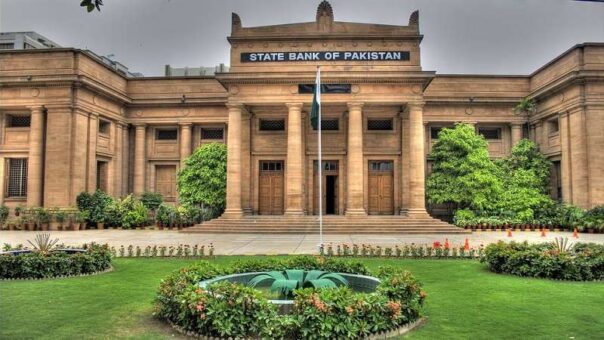Faisalabad, October 30, 2024 – The Faisalabad Chamber of Commerce & Industry (FCCI) welcomed the Federal Board of Revenue’s (FBR) recent decision to exempt old-age citizens and certain sales taxpayers from the requirement of biometric verification. This policy shift addresses long-standing concerns raised by the FCCI regarding the challenges some taxpayers face with biometric technology.
(more…)Tag: biometric
-

SBP Makes Biometric Verification Mandatory for All Branchless Banking Transactions
Karachi, October 26, 2023 – The State Bank of Pakistan (SBP) has taken a significant step to combat money laundering and terrorist financing by making biometric verification mandatory for all branchless banking (BB) transactions.
(more…) -

SBP’s instructions on pensioners biometric verification
KARACHI: The State Bank of Pakistan (SBP) on Friday issued instructions regarding biometric verification of pensioners.
Prior to these instructions the SBP issued BC&CPD Circular Letter No. 01 dated February 01, 2021 and File Letter No. BC&CPD/O&SSD/BVS/5873 dated May 27, 2021 on the subject.
The Finance Division issued a letter on December 08, 2021 on the subject of Biometric Verification Service, contents of which are self-explanatory, the central bank said.
The said instructions of bio metric verification service are for pensioners drawing pension from AGPR Islamabad. All banks are advised to comply with the instructions contained therein.
Further, all banks are advised to ensure widespread publicity of the above initiative through branches and other means for awareness of the pensioners.
-

NCCPL directs verification of stock investors through biometric
KARACHI: National Clearing Company of Pakistan Limited (NCCPL) has issued guidelines to register / verify all investors of stock market through biometric system.
The NCCPL on Monday issued communication to Pakistan Stock Exchange (PSX) to direct all authorized intermediaries (AI) and clearing members to register existing customers in Centralized Know Your Customer (CKO).
The NCCPL said that in pursuance of provisions stipulated under clause 9.1 (x) of CKO Regulations 2017 and NCCPL Regulations clause 5.11, Authorized Intermediaries (AI) are required to register their existing Customers, in the KYC Database to obtain Unique KYC Number (UKN) and tagging of such UKNs with the relevant Authorized Intermediary within the time period notified by the CKO.
In view of above, all Authorized Intermediaries are hereby notified to register their existing Customers (i.e existing customers registered through NCSS UIN database before June 17, 2019) in the KYC Database and obtain UKN latest by May 31 2020.
Further, Clearing Members still not yet admitted as AI shall be required to get them registered as AI and also required to register their customers in CKO by May 31, 2020.
For the purpose of facilitating the Authorized Intermediaries, step wise key elements of the existing Customer registration process under CKO have been briefly explained below;
1. AI shall be required to carry out Biometric Verification of the Customer (Applicable on individual customer only).
2. AI is required to submit online KYC form of the existing customer via KYC Information System. Moreover, hard copy of KYC Form as prescribed under Annexure II, III and IV of the CKO Regulations, 2017 in signed form shall be required for all Types of Customers.
3. In case of joint account holder(s), the AI shall be required to carry out Biometric Verification and proceed with KYC Application Form for each account holder separately.
4. After submission of KYC Application Form electronically in KIS, AI will be required to submit hard copy of original KYC Application Form and Supporting Documents to CKO within 5 working days as per existing practice. The supporting documents may also be submitted through the upload functionality made available in the KIS.
5. CKO will initiate necessary processing and complete its verification within 10 working days from the date of receipt of KYC Application Form along with all the required supporting documents.
6. Upon such verification, CKO will approve KYC Application Form in KIS and Unique KYC Number (UKN) will automatically be generated for such Customer in KIS.
7. After issuance of UKN, CKO will obtain confirmation from corporate Customer, foreign individuals and foreign corporate Customers for the issuance of UKN within 15 working days in accordance with the Regulations.
8. In case of any discrepancy found in KYC form, AI will be required to remove it within 10 working days.
9. Customers registered with multiple AIs will be required to complete their KYC process with all AIs one by one. If their KYC process is not completed with the AI through whom the process was first initiated, such customers shall not be allowed to initiate their KYC process with the other AIs.
The NCCPL warned that failure to comply the above mentioned clause within stipulated time shall lead to necessary action in accordance with clause 9.1 (v) of CKO Regulations, 2017 and clause 5.11 of NCCPL Regulations whereby UIN tagging of the Customer with such Authorized Intermediary/Clearing Member shall be blocked and trading through such client code shall be restricted.
However, pending transactions of such customers will be settled through respective Securities Broker in NCSS. Moreover, squaring-up of open positions in all Markets including Leveraged Markets and selling of Securities held in the sub-account(s) will be allowed.
For complete details please refer clause 5.11 of NCCPL Regulations and clause 9.1 of CKO Regulations, 2017.
For any further queries or concerns, please feel free to contact the Customer Support Services of your respective locations.
-

Biometric verification of all saving scheme investors to be conducted under FATF recommendations
ISLAMABAD: The government will conduct biometric verification of all investors of National Saving Schemes in order to make compliance with recommendations of Financial Action Task Force (FATF), a statement issued by Finance Division said on Saturday.
Asia Pacific Group in its recently published Mutual Evaluation Report (MER 2019), has pointed out number of deficiencies on the part of Central Directorate of National Savings (CDNS) in terms of compliance to FATF recommendations, which has negatively affected the overall grading of different recommendations specially the recommendation 10, 11, 12 and 15.
In this context, CDNS is committed to mitigating the deficiency to improve customer service delivery and to comply the FATF recommendation to safeguard the interest of the investors, it said.
Banks under the supervision of SBP have already put in place all the required systems and KYC processes to comply the FATF recommendation.
Finance Division through promulgation of National Savings Schemes (AML-CFT) Rules, 2019 has decided to engage an AML-CFT compliant bank, through competitive bidding, to put in place the requirement as well as the necessary training of employees of Central Directorate of National Savings (CDNS).
Accordingly, Expression of Interest, in consultation with SBP, has been sought from the interested bank to conduct KYC (Know Your Customer) and other requirement of new as well as existing client of CDNS.
This will include the biometric verification and screening of potential clients in UN Proscribed Person List.
All these screenings are meant to stop any ill-gotten money to become part of financial system and to safeguard the valued investor from the menace of Money Laundering and Terrorist Financing.
Central Directorate of National Savings (CDNS) as it stands today is one of the longstanding institutions in the country with a legacy of more than 140 years.
The institution has always been a symbol of unshakable trust of the public.
National Savings is playing its pivotal role to inculcate the Culture of Savings, facilitate Financial Inclusion and extending Social Security Net to the deserving sections of the society.
Around 33 percent of CDNS deposits are in Welfare Schemes which attribute around 2 percent incremental rate of profit over and above other regular savings schemes.
Currently, CDNS manages portfolio of Rs. 4,038 billion (November 2019) of more than 7 million investors.
National Savings Schemes (“NSS”) provide risk free and competitive avenue to all segments of society specially the most vulnerable i.e. senior citizens, pensioners, widows, physically challenged persons and family members of Shuhada.
On the other hand, it provides a non-inflationary and cost effective borrowing to the government to bridge the overall fiscal deficit which ultimately reduces dependency on external borrowing.
About 19 percent of domestic debt consists of NSS while these deposits are equal to 28 percent of total deposit of scheduled bank.
One of the main challenges to CDNS was its manual operations and lack IT, therefore, CDNS has started its journey of automation in 2009 and successfully completed PSDP funded Automation Project Phase I & II in 2013 and 2017.
Through these project 223 National Savings Centre (“NSC”) i.e. (60 percent out of total 376) have been successfully automated.
Automation of remaining 153 is in active process with support of Department for International Development (DFID), UK.
Meanwhile, CDNS has upgraded its core business solution from decentralized to centralized architecture.
Around 144 branches have already been shifted to upgraded solution where customer transaction time has significantly reduced.
Also, the provision of Alternate Delivery Channels (ATM) is in final stages which will further improve the service delivery. Introduction of technology has provided CDNS the opportunity to modernize its process which include swift data reporting, reconciliation with other departments, budgeting and forecasting, customer data base etc.
Due to IT progress CDNS is now capable to implement number of initiatives which was not possible due to manual operation.
-

SBP directs biometric verification of branchless banking accounts by March 31
KARACHI: State Bank of Pakistan (SBP) has directed financial institutions to ensure biometric verification of branchless banking customers by March 31, 2020.
In a circular issued on Tuesday directed all banks and microfinance banks to complete biometric verification of all level-1 accounts by March 31, 2020. In case biometric verification is not performed, the financial institutions shall convert all these accounts to Level – 0 with effect from April 01, 2020.
The transaction limits for Level – 1 accounts are as follow:
a. Rs. 50,000 per day [This limit shall not be applicable on: (i)credit from employers for salaried persons against proof of employment and (ii) payment to trusted merchants including schools and hospitals etc.]
b. Rs. 200,000 per month
The transaction limits for Level-0 accounts are as follow:
a. Rs. 25,000 per day
b. Rs. 50,000 per month
c. Rs. 200,000 per year
d. Rs. 200,000/- maximum balance limit
The financial institutions operating branchless banking are required to follow regulations related to Know Your Customer (KYC)/Account Opening requirements and conditions:
For Level-0 accounts:
a) Verification of customer identity from NADRA
b) Pre-screening the name and CNIC against proscribed/designated persons and entities as per the Statutory Notifications issued by Federal Government from time to time.
c) Call Back Confirmation or generation of One-Time Password (OTP) for verification in remote account opening.
For Level-1 accounts:
a) Biometric Verification of customer from NADRA
b) Pre-screening the name and CNIC against proscribed/designated persons and entities as per the Statutory Notifications issued by Federal Government from time to time.
c) Call Back Confirmation or generation of One-Time Password (OTP) for verification in remote account opening.
The SBP said that financial institutions shall keep all necessary record obtained through CDD measures, account files and business correspondence and results of any analysis undertaken, for at least ten years following the termination of the business relationship.
The central bank further said that the financial institutions shall ensure that documents, data or information collected under the CDD process is kept up to date and relevant, by undertaking reviews of existing records.
-

About 7.65 million bank accounts still require biometric verification for AML/CFT compliance
KARACHI: Around 7.65 million bank accounts are still unverified till June 30, 2019. The verification of bank accounts is mandatory through biometric system in order to mitigate risks of money laundering and terror financing.
(more…) -

SBP facilitates overseas Pakistanis in biometric verification
KARACHI: State Bank of Pakistan (SBP) has facilitated overseas Pakistanis in their biometric verification for operating bank accounts.
In a statement on Thursday, the SBP said that realizing difficulties being faced by overseas Pakistan in operating their bank accounts due to non-biometric verification of their accounts, State Bank of Pakistan has issued detailed instructions on the alternate arrangement to facilitate their biometric verification.
It may be mentioned here that as per alternate arrangement, overseas Pakistanis may approach their respective banks through email/surface mail and provide identity documents like valid Passport, Visa, CNIC and NICOP (National Identity Card for Overseas Pakistanis) as an alternative arrangement for biometric verification for operating their bank accounts as usual.
The arrangement has been made in line with State Bank’s continuous monitoring of the progress of the banking industry with respect to biometric verification; and it has been reiterated to banks for extending their fullest cooperation to their overseas customers.
-

SBP issues instructions for bank account biometric verification of Pakistanis living abroad
KARACHI: The State Bank of Pakistan (SBP) on Monday issued instructions for biometric verifications of bank account holders of Pakistanis living abroad.
The banks are conducting biometric verification of existing customers in compliance of Anti Money Laundering/ Counter Finance Terrorism (CFT) Regimes.
a. Non-resident Pakistanis (NRPs) as defined in Income Tax Ordinance, 2001 – Chapter 5, Division II, Section 82:
For customers who fall under the definition of NRP, the bank/ DFI may obtain a signed undertaking from the customer invariably containing the following:
• Customer’s NRP status along with proof (i.e. copy of valid passport, visa, exit stamp, resident permit, etc.)
• Copy of valid ID document (CNIC/ NICOP)
• Account number(s) of the customer’s account(s) maintained with the bank as per customer record
• Undertaking by the customer to inform the bank of any change in residency status
The bank/ DFI, after verification of the customer’s signature from its record, shall accordingly update/ reflect the NRP status in the customer profile.
For such customers, as an alternative to biometric verification, the bank/ DFI may conduct fresh NADRA Verisys using the information provided by the customer.
b) Resident Pakistanis temporarily outside Pakistan:
For customers who do not qualify under the definition of NRP, but are currently/ temporarily outside Pakistan for any reason, the bank/ DFI may obtain reasonable evidence/ proof from the customer regarding his/ her absence from the country (i.e. copy of valid passport, visa, exit stamp, resident permit, etc.) and the expected date of return.
For such customers, as an alternate to biometric verification, the bank/ DFI may conduct fresh NADRA Verisys using the information provided by the customer.
The bank/ DFI may retain the NADRA Verisys in place of biometric verification until the customer returns, subject to reasonable time limit (not more than six months) to be defined by banks/ DFIs. Biometric verification of such customers shall be done immediately upon the customer’s return to the country.
c) Joint Accounts- where one account holder is outside Pakistan (NRP/ temporarily):
For joint account holders, treatment of biometric verification should be done according to the status of respective individual. Biometric verification should be conducted for the joint account holder who is resident Pakistani, while for other joint account holders, the relevant procedure described at (a) and (b) above should be adopted.
The SBP said that it is again advised that as per the Frequently Asked Questions (FAQs) on Use of Biometric Technology issued by SBP vide BPRD Circular Letter No. 20 dated June 14, 2017, banks/ DFIs may operate accounts on the basis of NADRA Verisys in genuine cases (as provided in FAQ No. 8), provided the bank/ DFI is satisfied and proper reason/ proof is recorded/ retained by the bank/ DFI.
For such cases in line with Para-3 above, in the absence of biometric verification, bank/ DFI may ensure that requisite identification document has been obtained, marked as ‘original seen’ by their staff and verified through NADRA Verisys. Moreover an undertaking should be obtained from the customer declaring that the particulars provided to the bank/ DFI are correct and that their staff has verified the same. The declaration should be endorsed by the Branch Manager and should be available in the bank’s centralized record.
